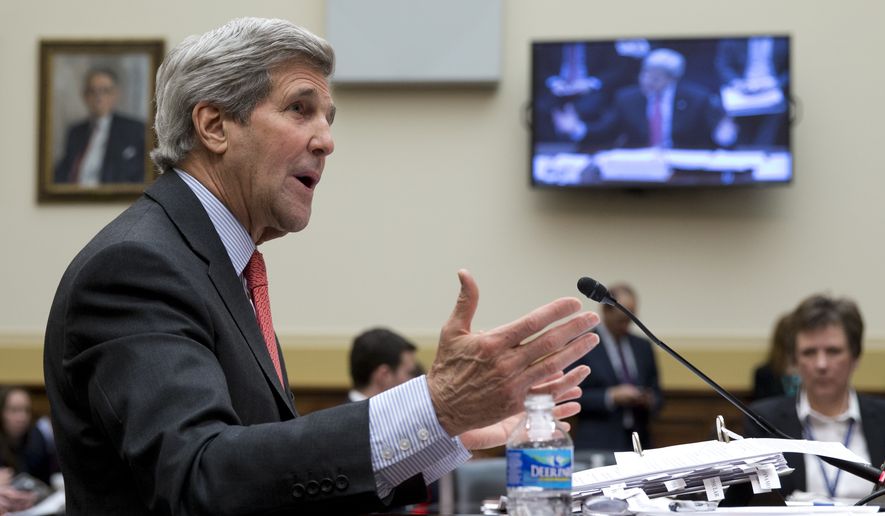Secretary of State John F. Kerry drew heat from from one Republican lawmaker Wednesday when he said the task of providing American leadership in the world is far more complicated today than it was during the Cold War era — particularly in the face of religious extremism emerging in the post-Arab Spring Middle East.
Mr. Kerry said “the greatest generation” put the U.S. on “a course to win the battle against tyranny, dictatorship and to win the battle for democracy and human rights and freedom for a lot of people.” But given the complexities of today’s world, he said, “the Cold War was simple compared to this.”
“[It was] bipolar, pretty straight-forward conversations,” the secretary of state said. “Yeah, we had to make big commitments, but it wasn’t half as complicated in the context of dealing country to country, and with tribes, with culture, with a lot of old history.”
The comments, made during a House Foreign Relations Committee hearing on the State Department’s 2016 budget request Wednesday, did not sit well with Rep. Dana Rohrabacher, California Republican.
“I’d just like to respectfully disagree,” Mr. Rohrabacher told Mr. Kerry. “The fact is that I believe what the difference was, was not that the world wasn’t so complicated, but that the greatest generation knew how to set priorities.”
“[Ronald] Reagan exemplified that in the Cold War when he said ‘what’s your goal with the Soviet Union,’ who was our primary enemy at that time,” the senator said. “[Reagan] said, ‘we win, they lose,’ and he knew that that was his number one goal, and by the end of his administration, we had eliminated the Cold War without a direct confrontation.
“Today, we should set the priority, which is, who is our primary enemy? Who is the primary threat to the well-being and security of our people,” Mr. Rohrabacher added. “I think we have to come to the realization that it’s radical Islam. … I know our president has a little bit of difficulty saying those words together … but I have no problem saying it.”
The exchange passed by without further confrontation. But it exemplified a core frustration many Republicans say that they have with the Obama administration — that its foreign policy is over-complicated, with too much focus on nuance and neutrality, and not enough on firm strategic objectives.
In his initial comments, Mr. Kerry had suggested he was aware of the potential sensitivity associated with comparing the current era to the past.
“I don’t want to over-blow it,” he said. “I’m not trying to, but this is a big moment of transport, of transformation, where there are literally hundreds of millions of people emerging on this planet, young people,” Mr. Kerry said. “Count the numbers of countries where the population is 65 percent under the age of 30, 60 percent, 30 and under, 50 percent under the age of 21. I mean, it’s all over the place.”
“If they live in a place where there’s bad governance, or corruption, or tyranny, in this world where everybody knows how to be in touch with everybody else all the time, you have a clash of aspirations, a clash of possibilities and opportunities,” he said. “That certainly was the beginning of the Arab Spring, which is now being infused with a sectarianism and confusions of religious overtones and other things that make it much more complicated than anything that has proceeded this.”
• Guy Taylor can be reached at gtaylor@washingtontimes.com.




Please read our comment policy before commenting.